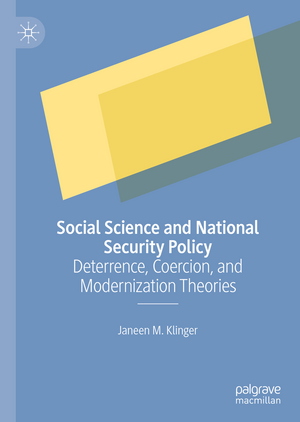Social Science and National Security Policy: Deterrence, Coercion, and Modernization Theories
Autor Janeen M. Klingeren Limba Engleză Hardback – 19 feb 2019
This book examines how deterrence, coercion and modernization theory has informed U.S. policy, addressing why former Defense Secretary Robert McNamara’s famous description of the Vietnam War as the “social scientist’s war” is so accurate. By tracing the evolution of ties between social scientists and the government beginning in World War I and continuing through the Second World War and the early Cold War, the narrative highlights the role of institutions like the RAND Corporation, the Social Science Research Council and MIT’s Center for International Studies that facilitate these ties while providing a home for the development of theory. The author compares and contrasts the ideas of Bernard Brodie, Herman Kahn, Albert Wohlstetter, Thomas Schelling, Gabriel Almond, Lucian Pye and Walt Rostow, among others, and offers a cautionary tale concerning the difficulties and problems encountered when applying social science theory to national security policy.
Preț: 585.73 lei
Preț vechi: 689.09 lei
-15% Nou
Puncte Express: 879
Preț estimativ în valută:
112.08€ • 122.13$ • 94.44£
112.08€ • 122.13$ • 94.44£
Carte tipărită la comandă
Livrare economică 23 aprilie-07 mai
Preluare comenzi: 021 569.72.76
Specificații
ISBN-13: 9783030112509
ISBN-10: 3030112500
Pagini: 252
Ilustrații: IX, 252 p.
Dimensiuni: 148 x 210 mm
Greutate: 0.47 kg
Ediția:1st ed. 2019
Editura: Springer International Publishing
Colecția Palgrave Macmillan
Locul publicării:Cham, Switzerland
ISBN-10: 3030112500
Pagini: 252
Ilustrații: IX, 252 p.
Dimensiuni: 148 x 210 mm
Greutate: 0.47 kg
Ediția:1st ed. 2019
Editura: Springer International Publishing
Colecția Palgrave Macmillan
Locul publicării:Cham, Switzerland
Cuprins
1. Evolution of a Partnership: Social Science and National Security Policy.- 2. The Nature Sciences and Public Policy: Insights from the History and the Philosophy of Science.- 3. The Science of Strategy: Deterrence and Coercion Theory.- 4. A Scientific Approach to Development: Modernization Theory.- 5. Theory Meets Practice: The Case of the Vietnam War.
Notă biografică
Janeen M. Klinger is Emeritus Professor in the Department of National Security and Strategy at the U.S. Army War College, USA. She previously taught at the Marine Corps Command and Staff College and the University of Mary Washington.
Textul de pe ultima copertă
This book examines how deterrence, coercion and modernization theory has informed U.S. policy, addressing why former Defense Secretary Robert McNamara’s famous description of the Vietnam War as the “social scientist’s war” is so accurate. By tracing the evolution of ties between social scientists and the government beginning in World War I and continuing through the Second World War and the early Cold War, the narrative highlights the role of institutions like the RAND Corporation, the Social Science Research Council and MIT’s Center for International Studies that facilitate these ties while providing a home for the development of theory. The author compares and contrasts the ideas of Bernard Brodie, Herman Kahn, Albert Wohlstetter, Thomas Schelling, Gabriel Almond, Lucian Pye and Walt Rostow, among others, and offers a cautionary tale concerning the difficulties and problems encountered when applying social science theory to national security policy.
Janeen M. Klinger is Emeritus Professor in the Department of National Security and Strategy at the U.S. Army War College, USA. She previously taught at the Marine Corps Command and Staff College and the University of Mary Washington.
Janeen M. Klinger is Emeritus Professor in the Department of National Security and Strategy at the U.S. Army War College, USA. She previously taught at the Marine Corps Command and Staff College and the University of Mary Washington.
Caracteristici
Discusses the evolution of the partnership between social science and US national security policy Uses a combination of two different theories to illustrate their contribution to American strategy in Vietnam Demonstrates the two mechanisms by which ideas enter the policy world: one that is diffuse like “water through limestone” and the other by way of policy entrepreneurs that work directly as proponents of policies based on their ideas
